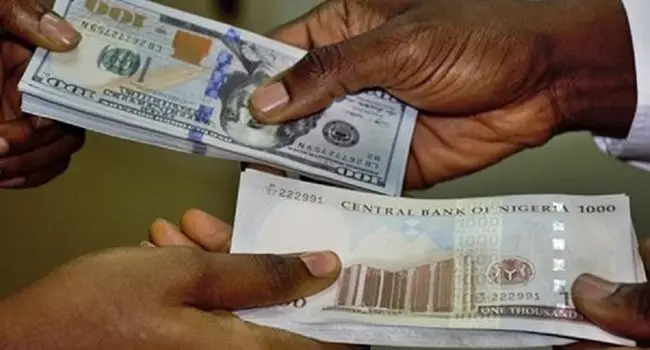Unraveling the Exchange Rate Mystery: Decoding 75,000 Won to USD

In the dynamic world of international finance, exchange rates play a pivotal role in shaping economic landscapes and influencing global trade. For those unfamiliar with the intricacies of currency conversion, the process can seem like a complex puzzle. In this article, we delve into the conversion of 75,000 South Korean Won (KRW) to United States Dollars (USD), exploring the factors that influence exchange rates and the significance of this particular conversion.
Understanding Exchange Rates
Exchange rates represent the value of one currency in terms of another. They fluctuate constantly due to various factors such as economic indicators, geopolitical events, and market sentiment. In the case of 75,000 Won to USD, the exchange rate determines how many U.S. dollars you would receive in exchange for 75,000 South Korean Won.
Current Exchange Rate
Exchange rates are subject to change, and as of the last available data, the exchange rate for the South Korean Won to U.S. Dollar stands at approximately 1,120 KRW to 1 USD. To calculate the equivalent in dollars for 75,000 Won, one would divide the amount in Won by the exchange rate:
75,000 KRW ÷ 1,120 KRW/USD ≈ 66.96 USD
Therefore, 75,000 South Korean Won is equivalent to approximately 66.96 U.S. Dollars at the current exchange rate.
Factors Influencing Exchange Rates
Several factors contribute to the fluctuation of exchange rates, making them a dynamic aspect of the global financial system. Here are some key factors influencing the South Korean Won to U.S. Dollar exchange rate:
- Economic Indicators: Economic indicators such as GDP growth, inflation rates, and employment figures can significantly impact a country’s currency value. Positive economic data may strengthen a currency, while negative indicators can lead to depreciation.
- Interest Rates: Central banks set interest rates, affecting the return on investment for holding a particular currency. Higher interest rates generally attract foreign investors, increasing demand for the currency and boosting its value.
- Political Stability: Political stability is crucial for maintaining investor confidence. Countries with stable governments are often perceived as safer investments, positively influencing their currency.
- Trade Balances: A country’s trade balance, the difference between exports and imports, influences the demand for its currency. Trade surpluses often lead to a stronger currency, while deficits can result in depreciation.
- Market Sentiment: Investor perceptions and sentiment play a vital role in currency movements. Speculation, geopolitical events, and global economic conditions can cause rapid changes in exchange rates.
Significance of 75,000 Won to USD
Now that we understand the mechanics of currency conversion and the factors influencing exchange rates, let’s explore the significance of converting 75,000 Won to U.S. Dollars.
- Travel and Tourism: For individuals traveling from South Korea to the United States, the conversion of 75,000 Won to USD is essential for budgeting and understanding purchasing power in the destination country.
- International Trade: Businesses engaged in cross-border trade between South Korea and the United States must consider exchange rates when invoicing and pricing products. Fluctuations in currency values can impact profit margins and competitiveness.
- Investment Opportunities: Investors looking to diversify their portfolios internationally may consider converting Won to USD to participate in U.S. financial markets. Currency exchange is a fundamental step in global investment strategies.
- Remittances and Transfers: Individuals sending money from South Korea to the United States or vice versa must be aware of exchange rates to ensure the accurate and cost-effective transfer of funds.
- Foreign Exchange Markets: Currency traders actively participate in the foreign exchange (forex) markets, aiming to profit from fluctuations in exchange rates. The conversion of 75,000 Won to USD is of interest to forex traders seeking trading opportunities.
Conclusion
In the intricate world of finance, understanding currency conversion is a fundamental skill. Converting 75,000 South Korean Won to U.S. Dollars involves considering the current exchange rate, which is influenced by economic indicators, interest rates, political stability, trade balances, and market sentiment. Whether for travel, business, investment, or personal financial transactions, the significance of this conversion reflects the interconnectedness of the global economy. As exchange rates continue to evolve, staying informed about these dynamics is crucial for making well-informed financial decisions in an ever-changing landscape.
-
What is the current exchange rate for 75,000 Won to USD?
- As exchange rates are subject to constant fluctuations, the current rate should be checked using a reliable financial news source or a currency converter. As of the last available data, it was approximately 1,120 KRW to 1 USD.
-
How much is 75,000 Won in U.S. Dollars?
- Using the current exchange rate, you can calculate the equivalent by dividing 75,000 KRW by the exchange rate. As an example, at an exchange rate of 1,120 KRW to 1 USD, 75,000 KRW is approximately 66.96 USD.
-
What factors influence the exchange rate between the South Korean Won and the U.S. Dollar?
- Various factors impact exchange rates, including economic indicators, interest rates, political stability, trade balances, and market sentiment. Changes in these factors contribute to fluctuations in currency values.
-
How often do exchange rates change?
- Exchange rates can change multiple times a day due to market dynamics and global events. Monitoring rates regularly, especially if you are planning a financial transaction, is advisable.
-
Can I get the same exchange rate at any bank or currency exchange service?
- Different banks and currency exchange services may offer slightly different rates due to fees and commissions. It’s recommended to compare rates and associated costs before making a currency exchange.
-
What is the best time to convert 75,000 Won to USD?
- Predicting the best time to exchange currency can be challenging, as it depends on various factors. Some people monitor economic indicators and geopolitical events to make informed decisions, while others use historical data for trend analysis.
-
How do economic indicators affect exchange rates?
- Economic indicators such as GDP growth, inflation rates, and employment figures can influence investor confidence and impact a country’s currency value. Positive economic data often strengthens a currency, while negative indicators may lead to depreciation.
-
Can I exchange currency at the airport, or are there better options?
- While currency exchange services are available at airports, rates may not be as favorable as those at local banks or specialized currency exchange offices. It’s advisable to compare rates and fees at different locations.
-
What precautions should I take when converting currency?
- Be aware of fees and commissions associated with currency conversion. Additionally, stay informed about current exchange rates and consider using reputable sources for currency exchange.
-
Are there any limits on the amount of currency I can exchange?
- Limits on currency exchange amounts can vary depending on the service provider and local regulations. It’s recommended to check with the specific bank or exchange service for any restrictions.
-
How can I protect myself from unfavorable exchange rates?
- Consider monitoring exchange rate trends, using limit orders to automate transactions at predetermined rates, and staying informed about economic developments that may impact exchange rates.
-
Is it possible to negotiate exchange rates?
- In most cases, exchange rates are non-negotiable at banks and official currency exchange services. However, in informal settings or with individual currency traders, some negotiation may be possible.
Remember that currency exchange is a dynamic process, and staying informed and making well-timed decisions can enhance the value of your transactions. Always consult with financial professionals for personalized advice based on your specific circumstances.






